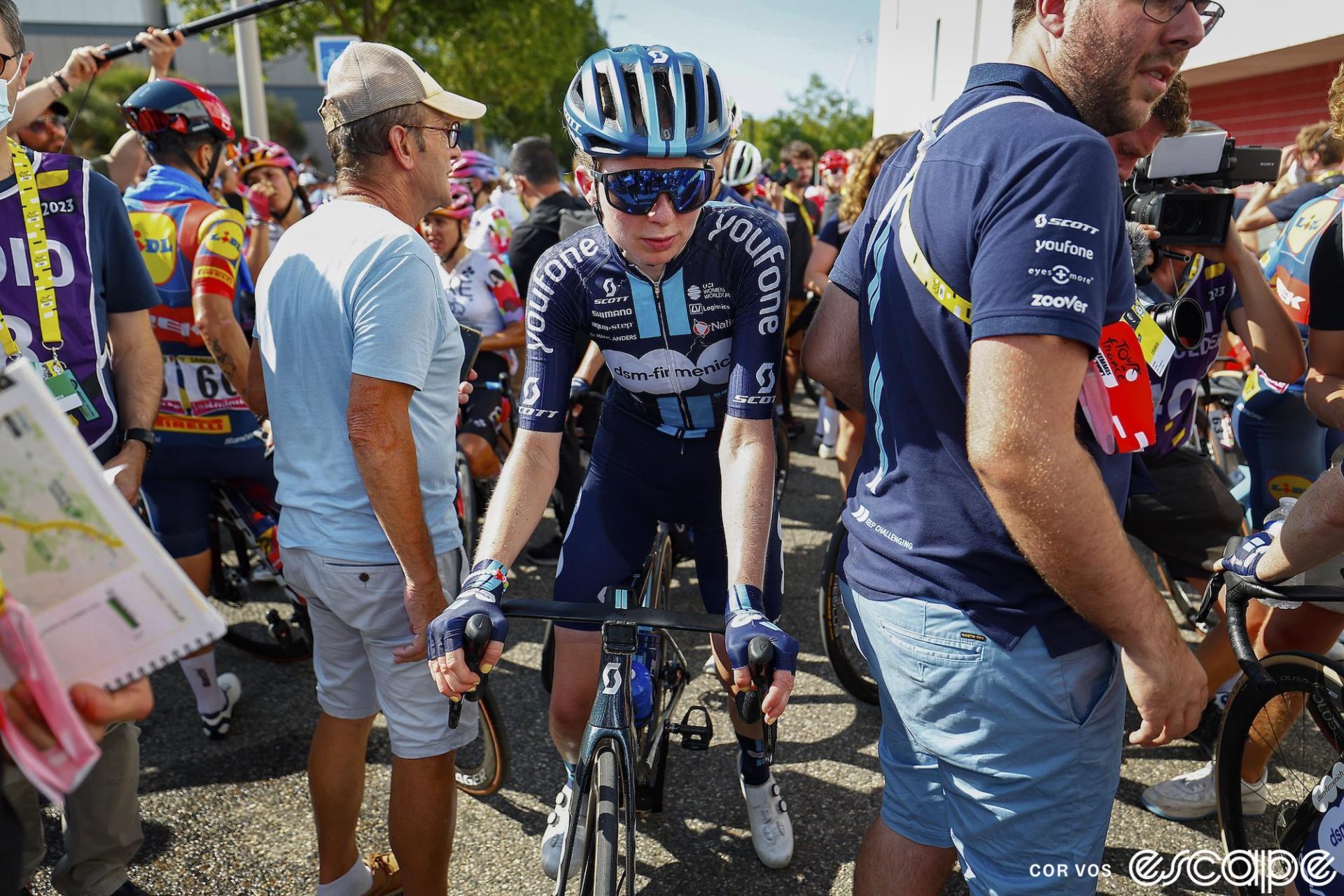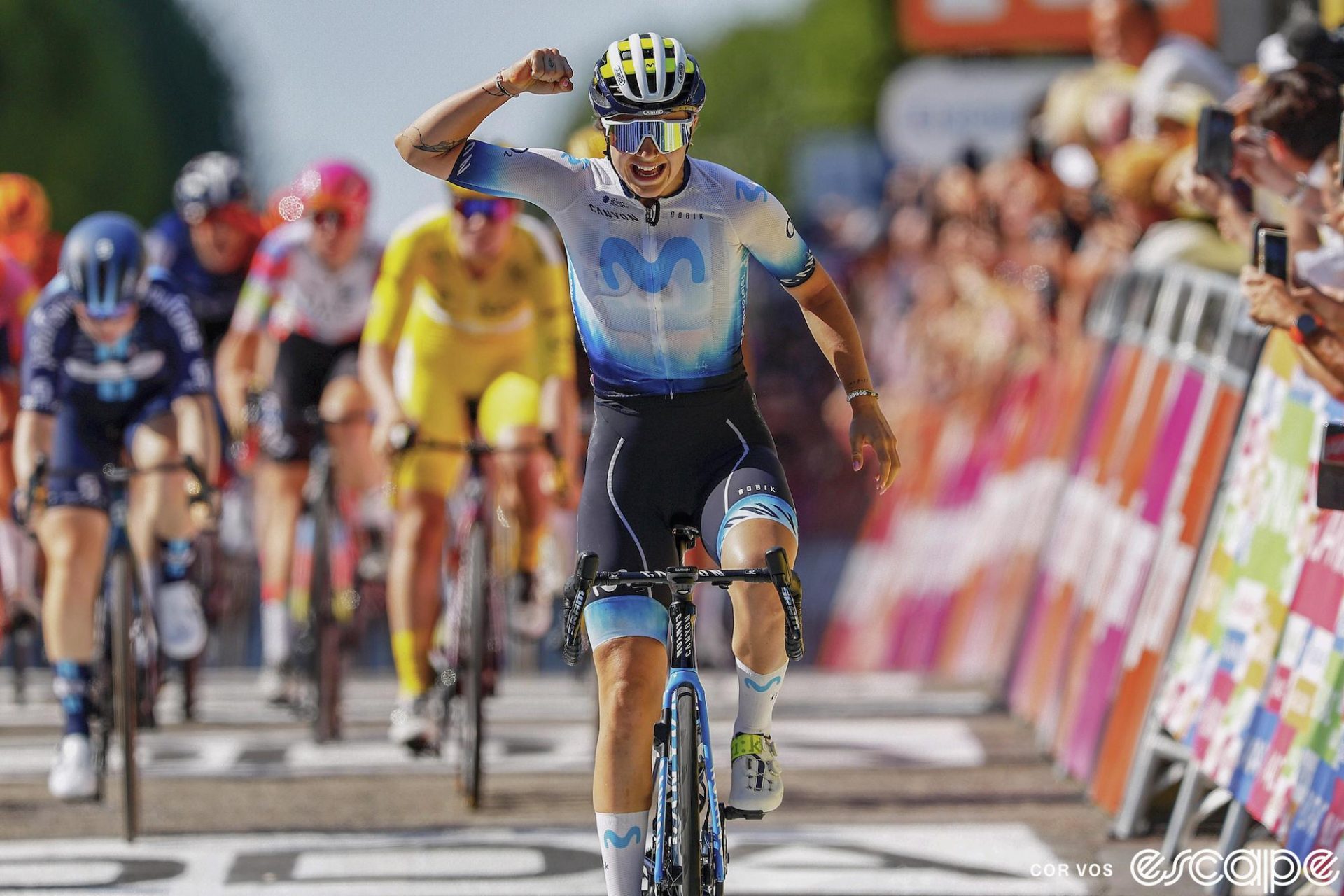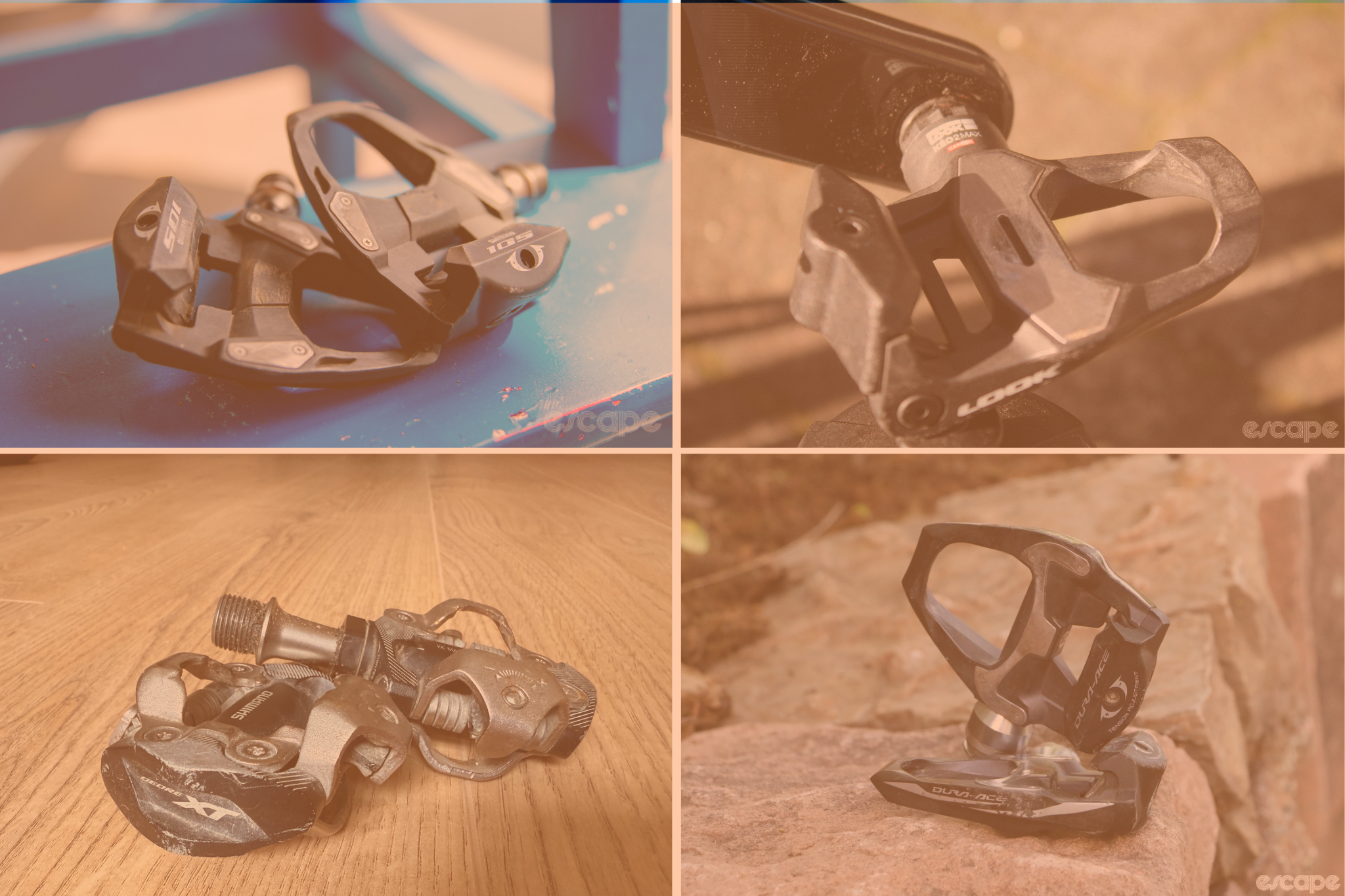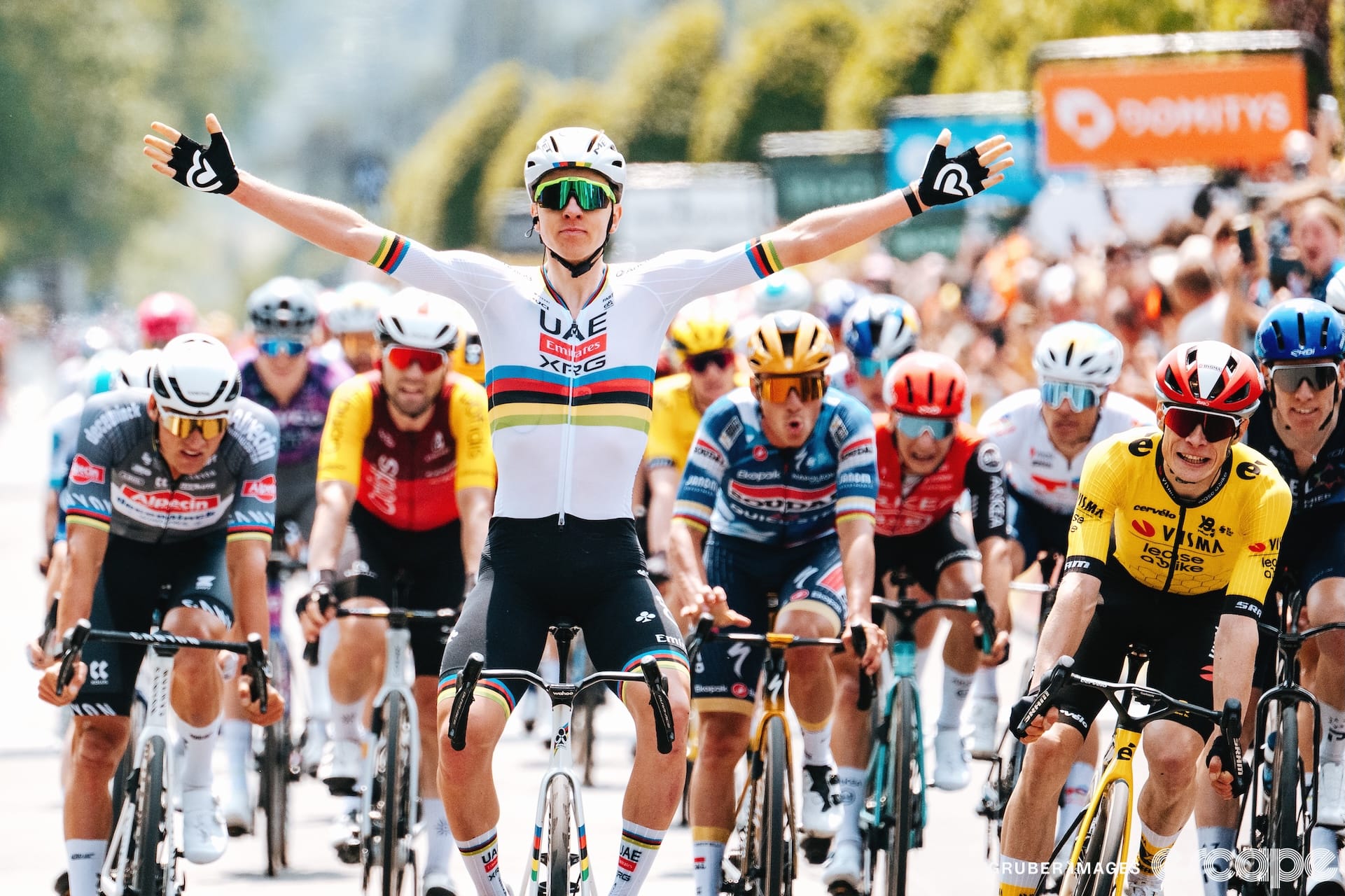Everyone is running out of time.
Teams who haven’t won anything yet have only today, the Tourmalet, or the time trial ahead of them. Riders who haven’t made a mark are now desperate to be seen. What is supposed to be a sprint stage cannot, after the events of yesterday’s alleged “sprint stage,” be automatically designated as such. This is why Sandra Alonso, Emma Norsgaard, and Agnieszka Skalniak-Sójka are away up front, a minute ahead and why they are riding hard. This is why FDJ-Suez’s and Lidl-Trek are attacking from behind. This is why the peloton is being stretched to pieces on a category 4 climb with 60 kilometers still in the race. Desperation is one word for it, eagerness another, hunger a third.
The breakaway has two days of hope to buoy them, which is a lot of hope. The peloton has profound self-interest to push them through the pain. All things could come back together, or they could be irrevocably torn apart. Only one thing is certain: it will be a fight. After the climbs settle into flat, things even out and settle into the day’s rhythm. The break gains 30 seconds, then a minute. There is one more categorized climb to go.
On the one hand, it’s a big day. On the other, no one wants to suffer today just to have nothing left for that prime day of profound suffering around which this race is oriented. Hence, teams huddle around their GC riders. No one wants any incidents. This race is stressful. By this point, there is visible exhaustion and suffering.
Women who once made headlines in other days fall behind and dangle into the abyss to finish at their own pace. The heat makes them wilt in their faces. Their work is work. When I look at them, especially in those moments of glory or attempts at glory, I’m reminded of a particular stanza by Rilke, who was always one to balance the necessity of suffering with the spiritual, with whatever it is that keeps us persevering through that pain:
Is pain – as soon as the ploughshare,
laboring, naturally reaches a new layer –
is pain not good? And what can it mean, the last
interrupting us in the depths of such affliction?
Speaking of interruptions, Rachel Neylan from Cofidis attacks on a small descent. Again, there is too much anticipation. Yet even this small jolt snatches back 20 seconds from the trio up front. It makes sense because the roads are narrowing into a little town, lined with people, their shouts a blur. The corners are tight and the road parts with obstacles. The hollow sound of brakes is picked up by the microphones. Grace Brown of FDJ-Suez sees the chaos as an opportunity and launches. She finds daylight, but has to keep her head down, down, down. But anticipation tolerates no one.
The outlines of possibility begin to reveal themselves for the breakaway with only 30 kilometers to go. DSM-Firmenich are riding, of course, for Charlotte Kool – it seems as though they are the only ones willing to commit at this time to a sprint despite the fact that very few of the teams are represented in the three riders ahead. Again, all it takes is Lotte Kopecky and Ashleigh Moolman-Pasio sprinting for leftover green jersey points to shave off the gap to a minute twenty.
Every day of this Tour has been a gamble with time. Sometimes, such as with the big ride of Julie Van de Velde, the gamble does not pay off. But with breakaway winners Yara Kastelijn and Ricarda Bauernfeind, the gamble paid dividends. Whether one can blame what’s happened on Tourmalet wariness, GC protectiveness, tactical blunders, exceptional boldness, or a combination of the above, I am personally not sure. What I am sure of is that these random attacks will not be enough to bring back the front three on these difficult-to-navigate roads. A concerted chase is needed, one on behalf of a team – maybe multiple teams – with real commitment. This is not happening, until it finally, finally does.
Jumbo-Visma starts to take it up. UAE Team ADQ also. But it is still not enough. The gap is still a minute. Norsgaard, Skalniak-Sójka, and Alonso will now really, really begin to think about the end – their opportunism can in retrospect seem like a reasonable gesture, a happy story. They will now start thinking also about the threat posed by one another. The trio have been necessary friends for the entire day, riding in mutual solidarity – the peloton is a shared enemy.
Skalniak-Sójka is the weakest link in terms of a sprint. Eyes are peeled for a move from her. Yet for now, they still cooperate. They have to. They are in the particular limbo long-range breaks find themselves in, a point of the utmost instability. The second they start being wary – and it is too early for that – is the second they turn over their sliver of power to the pursuers.
10 kilometers. 45 seconds. Jumbo-Visma is a lifeline for this peloton. They’ve learned their lessons from the other so-called sprint days. They will be able to see them on the long straightaway and there are a few of those. The landscape around Blagnac is not lovely. It is airport infrastructure and uncharismatic new-build apartments. Heat radiates from the asphalt. Gone are the cathedrals of Albi and Rouen. The romanticized part of France is not present here. There are no tourists taking pictures or contemplating their relationships with God. It is merely a place to stop with the room to stop in. Sometimes it’s like that, not unlike most of our modern lives.
Thirty-six seconds. The opportunists in the peloton are surely dwelling on a possible move. Knock the wind out of them and push through the space in front of them. Again the beast of wariness, not to be confused with patience. Thirty seconds. The plane trees, the fringes of their leaves brown from heat, line the long, black road which bifurcates fields. It is a linear vision. Twenty-four seconds. Seventeen.
Norsgaard urges commitment. If they don’t give it to her, she will have no qualms betraying them.
Ten seconds.
Norsgaard reaches her breaking point. She is over this. She and Skalniak-Sójka drop Alonso. The peloton can see them now as specks on the horizon. Norsgaard looks behind at her companion, come on. Eighteen seconds. The smallest hesitance will upset the balance of time and distance. Alonso is absorbed. Kopecky trails Jumbo-Visma who string it out, who push hard. Ten seconds again. The flamme rouge beckons in the suburban environs.
Just as it seems as though it all will come together, there is a big crash in the tricky, stupid corner over the tram lines. But there is no time to wait to assess the damage. The race is still unwinding. Anna Henderson launches to serve as a bridge. It is not enough. Norsgaard and Skalniak-Sójka, but then, only Norsgaard. With the pursuers close in the background she posts up. There is almost disbelief in the pursuers’ faces. A third breakaway.

In the wake of this win, the losses are big. No stage win for Vos. None for DSM and their sprinter Kool. Nothing so far for Lidl-Trek, Jumbo, UAE, FDJ, to name only a few of many. And yet – I truly believe the break would have been caught if it weren’t for the big crash caused by what was frankly a stupid infrastructural decision to route the route over the tram lines in the final run-in to what was expected to be a very fast bunch sprint.
In a scenario like that, who really is at fault? No one in the peloton, I believe, did anything wrong or paced incorrectly. The timing was lined up just right. The ending for them was just unfortunate. Regardless, there will likely be some reassessment going forward after three breakaways in a row, and of course, there will be some dwelling about the Tourmalet, which looms menacingly in the minds of each rider for her own reasons.
But that is tomorrow. Right now Norsgaard is laughing and smiling, hugging teammates, her eyes shining. In the exit interview, tears of disbelief fall from her eyes. She describes herself as “not a sprinter anymore” – which is true, and not just because she believes that she can’t keep up with the “real sprinters” (in her words) but because she has won from a different condition which requires a different set of skills: the power to get in the break and to basically sustain a major effort with massive time in the wind and also the diplomacy to keep whoever she’s with alongside her. This speaks to a versatility and the ability to change roles throughout one’s career, something which in my opinion is more prevalent in the women’s peloton than the men’s.
Norsgaard in her press conference makes clear that diplomacy in particular: “The last 10 ks, I was really trying to encourage them and, and I think the heard the same in the radios like me,” she says. “I'm lost for words. I don't know what to say. I did not expect it. The last five kilometers I maybe start believing in it, but otherwise I was just pulling like there was no tomorrow.”
But there’s something more to the victory, to all victories, than mere tactics or brute strength. For Norsgaard, that something the emotion she feels when speaking of her team, claiming she also cried when Liane Lippert took her win, which then boosted the morale of all the girls and staff. “We are really enjoying the time together and we are really friends, you know, on the team.”
“This,” she says, “makes miracles.”
Did we do a good job with this story?




